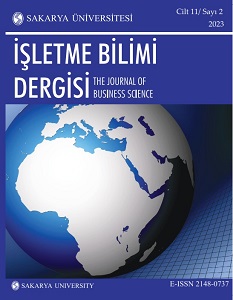Do Exchange Rate Fluctuations Effect Economic Growth in Nigeria? Empirical Evidence
Do Exchange Rate Fluctuations Effect Economic Growth in Nigeria? Empirical Evidence
Author(s): İlhan Eroğlu, Ayodeji Mubarak OlayiwolaSubject(s): National Economy, Economic policy, International relations/trade, Economic development, Financial Markets
Published by: Sakarya üniversitesi
Keywords: Exchange rate; Nigeria; Economic growth; ARDL model;
Summary/Abstract: Aim: This study aimed at assessing the impact of exchange rate on Nigeria's economic growth by decomposing it into positive and negative components. Method: A non-linear ARDL model was used to decompose the effect of exchange rate on economic growth. Also, asymmetric effects test was used to measure the effects of changes in the value of the naira. Findings: In the short run, when the Naira depreciates against the US dollar, economic growth tends to decline, while when it appreciates, economic growth tends to increase. In the long run, these effects work in the opposite direction. In addition, the test for asymmetric effects shows that the way in which the appreciation of the naira affects economic growth differs significantly from that of its depreciation Conclusions: The general conclusion from these findings is that the effect of exchange rate on economic growth in Nigeria is non-linear. It is also clear from the results that the stock of knowledge does not contribute much to the growth of the Nigerian economy. This is not surprising given the low education financing and enrolment rate in Nigeria. Therefore, the evidence gathered in this research suggests that Nigeria may be underutilising its capital stock to significantly support its economic growth.
Journal: İşletme Bilimi Dergisi
- Issue Year: 11/2023
- Issue No: 2
- Page Range: 146-162
- Page Count: 17
- Language: English

